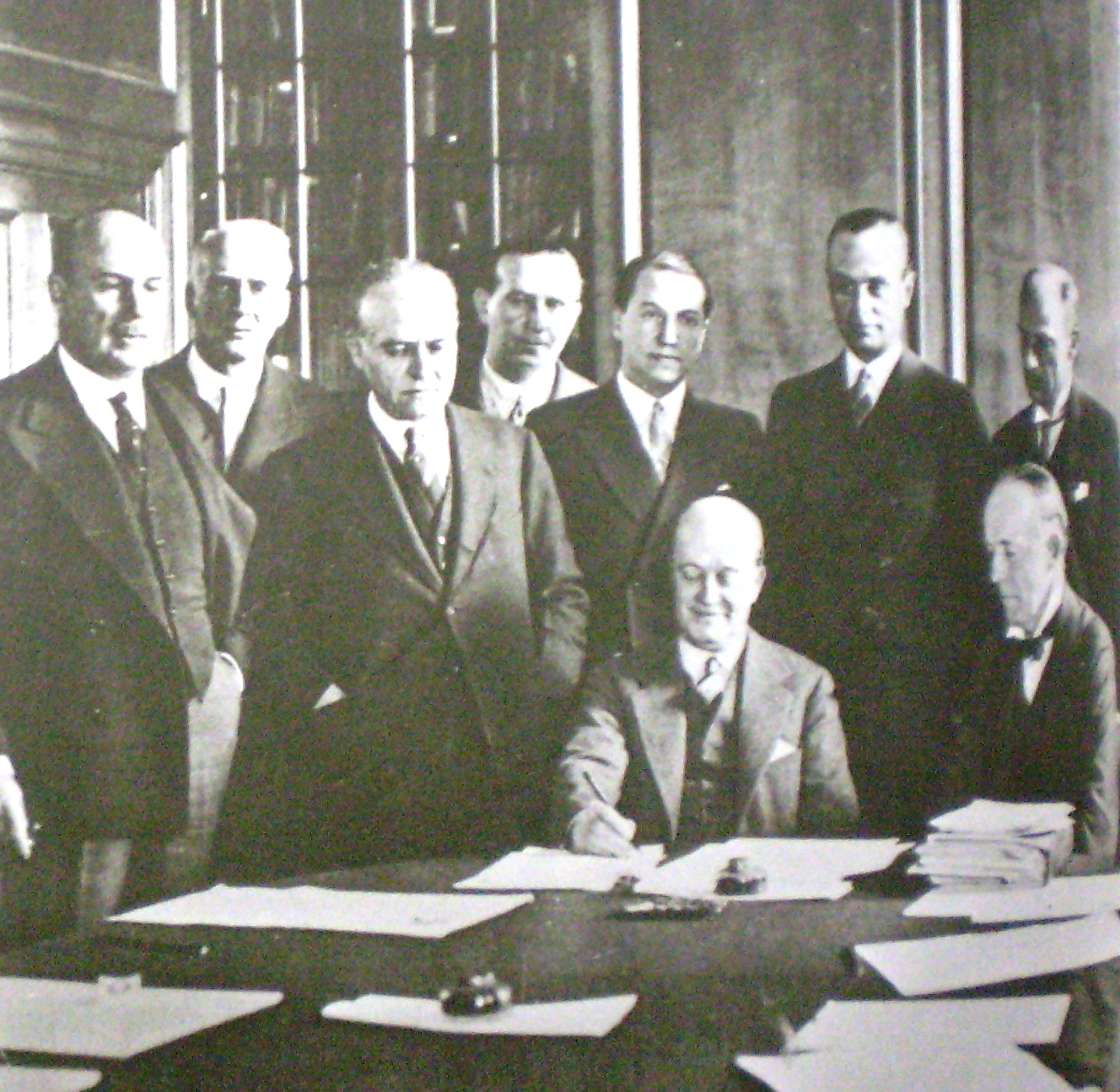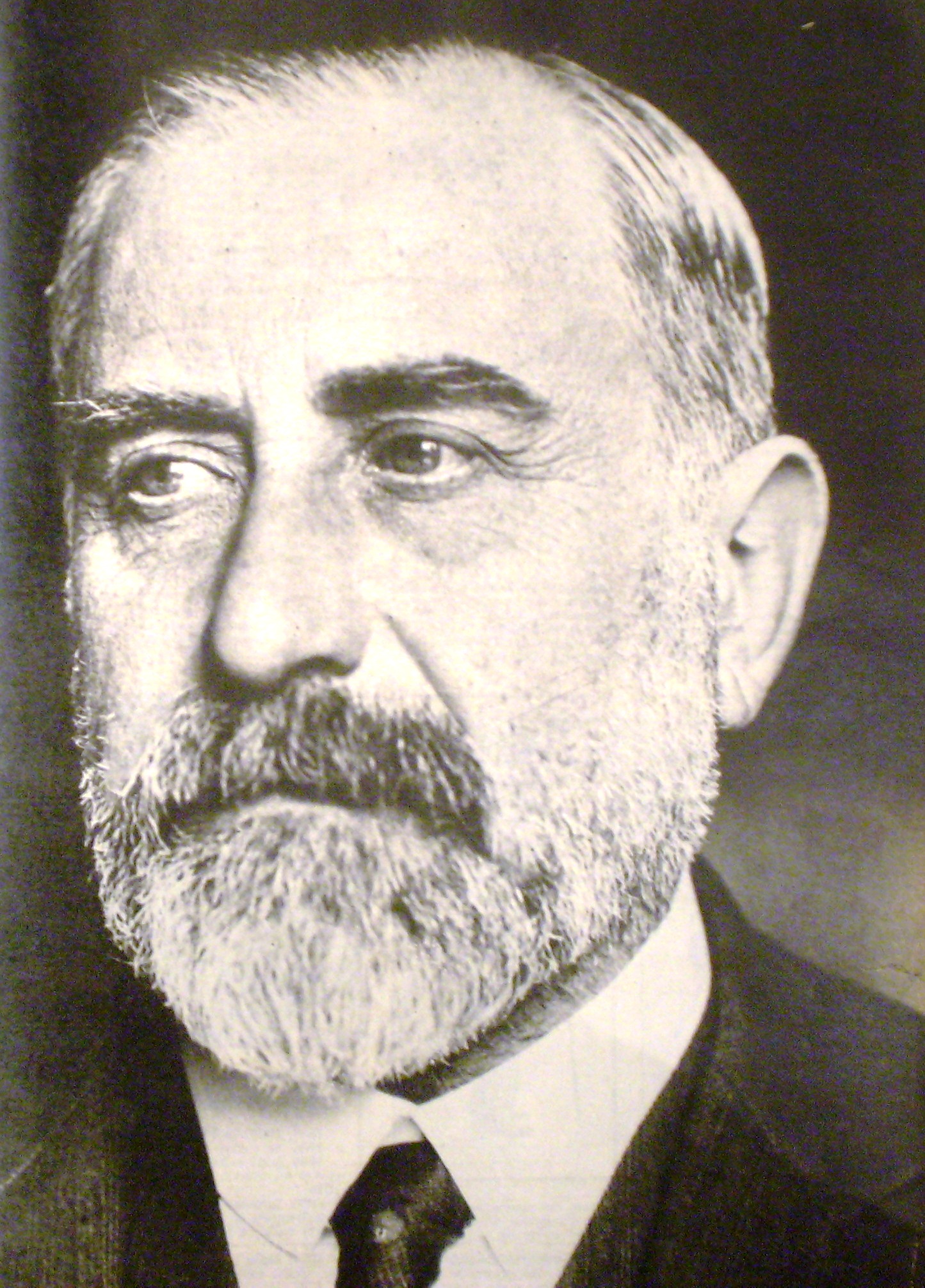|
Julio Argentino Pascual Roca
Julio Argentino Pascual Roca Funes (17 May 1873 – 8 October 1942) was an Argentine politician and diplomat. He was born to Clara Funes and General Julio Roca, who would become President of Argentina and dominate national politics for a generation after 1880. Earning a law degree at the University of Buenos Aires in 1895, he served in the Argentine Chamber of Deputies for Córdoba Province from 1904 to 1916, and in the Argentine Senate from 1916 to 1922. He was then elected Governor of Córdoba, serving from 1922 to 1925. The 1931 general elections made him Vice President of Argentina, serving from 1932 to 1938 with President Agustín Justo. His tenure as Vice President was remembered mainly for his being the co-author of the Roca-Runciman Treaty, signed with Great Britain in February 1933 in order to strengthen the commercial and financial ties between the two countries. Justo's successor, Roberto María Ortiz Jaime Gerardo Roberto Marcelino María Ortiz Lizardi (24 ... [...More Info...] [...Related Items...] OR: [Wikipedia] [Google] [Baidu] |
Argentina
Argentina (), officially the Argentine Republic ( es, link=no, República Argentina), is a country in the southern half of South America. Argentina covers an area of , making it the second-largest country in South America after Brazil, the fourth-largest country in the Americas, and the eighth-largest country in the world. It shares the bulk of the Southern Cone with Chile to the west, and is also bordered by Bolivia and Paraguay to the north, Brazil to the northeast, Uruguay and the South Atlantic Ocean to the east, and the Drake Passage to the south. Argentina is a federal state subdivided into twenty-three provinces, and one autonomous city, which is the federal capital and largest city of the nation, Buenos Aires. The provinces and the capital have their own constitutions, but exist under a federal system. Argentina claims sovereignty over the Falkland Islands, South Georgia and the South Sandwich Islands, and a part of Antarctica. The earliest recorded human prese ... [...More Info...] [...Related Items...] OR: [Wikipedia] [Google] [Baidu] |
1931 Argentine General Election
The Argentine general election of 1931 was held on 8 November. Background Following months of protest triggered in part by the onset of the great depression, a quiet coup d'état deposed the aging Hipólito Yrigoyen in September 1930. His country's first leader elected via universal suffrage (though without the participation of women), Yrigoyen had strained alliances within his own centrist Radical Civic Union (UCR) through frequent interventions against willful governors and had set business powerhouses such as Standard Oil against him through his support of YPF, the state oil concern founded in 1922. Staging its first coup since 1861, the Argentine military, then dominated by conservative, rural interests, called on José Félix Uriburu, a retired general and member of the Supreme War Council, to assume the role of Provisional President. Uriburu, the nephew of former President José Evaristo Uriburu, had no taste for politics and was in ailing health. [...More Info...] [...Related Items...] OR: [Wikipedia] [Google] [Baidu] |
University Of Buenos Aires Alumni
A university () is an educational institution, institution of higher education, higher (or Tertiary education, tertiary) education and research which awards academic degrees in several Discipline (academia), academic disciplines. Universities typically offer both undergraduate education, undergraduate and postgraduate education, postgraduate programs. In the United States, the designation is reserved for colleges that have a graduate school. The word ''university'' is derived from the Latin ''universitas magistrorum et scholarium'', which roughly means "community of teachers and scholars". The first universities were created in Europe by Catholic Church monks. The University of Bologna (''Università di Bologna''), founded in 1088, is the first university in the sense of: *Being a high degree-awarding institute. *Having independence from the ecclesiastic schools, although conducted by both clergy and non-clergy. *Using the word ''universitas'' (which was coined at its foundation ... [...More Info...] [...Related Items...] OR: [Wikipedia] [Google] [Baidu] |
Argentine People Of Spanish Descent
Argentines (mistakenly translated Argentineans in the past; in Spanish ( masculine) or ( feminine)) are people identified with the country of Argentina. This connection may be residential, legal, historical or cultural. For most Argentines, several (or all) of these connections exist and are collectively the source of their being ''Argentine''. Argentina is a multiethnic and multilingual society, home to people of various ethnic, religious, and national origins, with the majority of the population made up of Old World immigrants and their descendants. As a result, Argentines do not equate their nationality with ethnicity, but with citizenship and allegiance to Argentina. Aside from the indigenous population, nearly all Argentines or their ancestors immigrated within the past five centuries. Among countries in the world that have received the most immigrants in modern history, Argentina, with 6.6 million, ranks second to the United States (27 million), and ahead of other imm ... [...More Info...] [...Related Items...] OR: [Wikipedia] [Google] [Baidu] |
People From Córdoba, Argentina
A person ( : people) is a being that has certain capacities or attributes such as reason, morality, consciousness or self-consciousness, and being a part of a culturally established form of social relations such as kinship, ownership of property, or legal responsibility. The defining features of personhood and, consequently, what makes a person count as a person, differ widely among cultures and contexts. In addition to the question of personhood, of what makes a being count as a person to begin with, there are further questions about personal identity and self: both about what makes any particular person that particular person instead of another, and about what makes a person at one time the same person as they were or will be at another time despite any intervening changes. The plural form "people" is often used to refer to an entire nation or ethnic group (as in "a people"), and this was the original meaning of the word; it subsequently acquired its use as a plural form of per ... [...More Info...] [...Related Items...] OR: [Wikipedia] [Google] [Baidu] |
1942 Deaths
Year 194 ( CXCIV) was a common year starting on Tuesday (link will display the full calendar) of the Julian calendar. At the time, it was known as the Year of the Consulship of Septimius and Septimius (or, less frequently, year 947 ''Ab urbe condita''). The denomination 194 for this year has been used since the early medieval period, when the Anno Domini calendar era became the prevalent method in Europe for naming years. Events By place Roman Empire * Emperor Septimius Severus and Decimus Clodius Septimius Albinus Caesar become Roman Consuls. * Battle of Issus: Septimius Severus marches with his army (12 legions) to Cilicia, and defeats Pescennius Niger, Roman governor of Syria. Pescennius retreats to Antioch, and is executed by Severus' troops. * Septimius Severus besieges Byzantium (194–196); the city walls suffer extensive damage. Asia * Battle of Yan Province: Warlords Cao Cao and Lü Bu fight for control over Yan Province; the battle lasts for over 100 ... [...More Info...] [...Related Items...] OR: [Wikipedia] [Google] [Baidu] |
1873 Births
Events January–March * January 1 ** Japan adopts the Gregorian calendar. ** The California Penal Code goes into effect. * January 17 – American Indian Wars: Modoc War: First Battle of the Stronghold – Modoc Indians defeat the United States Army. * February 11 – The Spanish Cortes deposes King Amadeus I, and proclaims the First Spanish Republic. * February 12 ** Emilio Castelar, the former foreign minister, becomes prime minister of the new Spanish Republic. ** The Coinage Act of 1873 in the United States is signed into law by President Ulysses S. Grant; coming into effect on April 1, it ends bimetallism in the U.S., and places the country on the gold standard. * February 20 ** The University of California opens its first medical school in San Francisco. ** British naval officer John Moresby discovers the site of Port Moresby, and claims the land for Britain. * March 3 – Censorship: The United States Congress enacts the Comstock Law, making it ... [...More Info...] [...Related Items...] OR: [Wikipedia] [Google] [Baidu] |
Ramón J
Ramón or Ramon may refer to: People Given name *Ramon (footballer, born 1998), Brazilian footballer *Ramón (footballer, born 1990), Brazilian footballer *Ramón (singer), Spanish singer who represented Spain in the 2004 Eurovision Song Contest *Ramón Blanco y Erenas (1833–1906), Spanish brigadier and colonial administrator of the Philippines *Ramón Castillo (1873-1944), former Argentinian president *Ramon Dekkers, Dutch muay thai fighter *Ramón del Valle-Inclán (1866–1936), Spanish dramatist and novelist *Ramón Díaz, Argentine football player and coach * Ramón H. Dovalina (born 1943), American educator *Ramón Emeterio Betances (1827–1898), Puerto Rican nationalist *Ramón Arellano Félix (1964–2002), Mexican drug lord and fugitive *Ramón Fumadó (born 1981), Venezuelan diver * Ramón Fernando García (born 1972), Colombian road cyclist *Ramón Gerardo Antonio Estévez (born 1940), American actor, using the stage name Martin Sheen * Ramón González (athlete) (born ... [...More Info...] [...Related Items...] OR: [Wikipedia] [Google] [Baidu] |
Jerónimo Del Barco
{{disa ...
Jerónimo (European Portuguese and Spanish) or Jerônimo (Brazilian Portuguese) may refer to: * Jerónimo (name), a given or surname, Jerome in English ** Jeronimo (singer) (born 1990), Dutch pop singer and actor * Jeronimo (band), German band of the 1970s * ''Jeronimo: The Untold Tale of Koreans in Cuba'', a documentary film Jeronimo Lim Kim * A character in ''The Baroque Cycle'' by Neal Stephenson * A variant spelling of Geronimo, Apache leader * Jerônimo, a Brazilian indigenous politician See also * San Jerónimo (other) * * Jerome (other) * Saint Jerome (other) * Geronimo (other) * San Geronimo (other) * Geronimus (other) * Hieronymus (other) Hieronymus, in English pronounced or , is the Latin form of the Ancient Greek name (Hierṓnymos), meaning "with a sacred name". It corresponds to the English given name Jerome. Variants * Albanian: Jeronimi * Arabic: جيروم (Jerome) * Basq ... [...More Info...] [...Related Items...] OR: [Wikipedia] [Google] [Baidu] |
List Of Vice-Presidents Of Argentina
The vice president of Argentina ( es, Vicepresidente de Argentina), officially known as the vice president of the Argentine Nation ( es, Vicepresidente de la Nación Argentina), is the second highest political position in Argentina, and first in the line of succession to the president of Argentina. The office was established with the enactment of the Argentine Constitution of 1853. The vice president assumes presidential duties in a caretaker in case of absence or temporary incapacity of the head of state, and may succeed to the presidency in case of resignation, permanent incapacity, or death of the president. The longest vice presidential tenure as caretaker in Argentine history took place between 1865 and 1868, while President Bartolomé Mitre was preoccupied with the Paraguayan War. Seven Argentine vice presidents have succeeded to the presidency: Juan Esteban Pedernera (1861); Carlos Pellegrini (1890); José Evaristo Uriburu (1895); José Figueroa Alcorta (1906); Victorino ... [...More Info...] [...Related Items...] OR: [Wikipedia] [Google] [Baidu] |


_1938.jpg)
